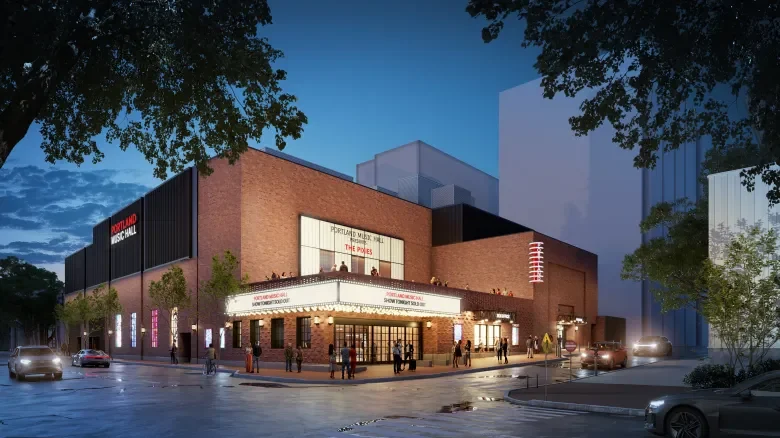What will Portland do about Live Nation’s proposed venue downtown?

A rendering of the Portland Music Hall, a venue proposed in the heart of Portland by Mile Marker Investments and Live Nation. (Image by Leonardo Ruben Merlos)
A new Live Nation concert venue with more than 3,000 seats. Independent promoters and local musicians rallying in opposition. Contentious public meetings.
It’s a familiar story.
But in this case, the drama recently unfolded in the other Portland.
Earlier this year, Live Nation won a land use battle and got a building permit for a midsize venue in Oregon. A similar project involving the concert promoter in Maine’s largest city has stalled. The Portland Music Hall is on hold after the City Council enacted in August a moratorium on new entertainment venues and concert halls in response to overwhelming opposition.
On Tuesday, a city committee will discuss a proposed change to licensing and land use code that would block the venue if passed.
Live Nation’s opponents say this case is unique.
“If we’re able to stop this venue, we will be the first city in the country to do so,” said Scott Mohler, executive director of the Maine Music Alliance, a coalition of local venues, musicians and arts organizations that have rallied against Live Nation.
Todd Goldenfarb, a longtime local developer involved in the project, said Friday evening that the team is reviewing the new proposal.
“We strongly oppose any targeted effort to block the Portland Music Hall,” he wrote in an email.
WHAT’S ON THE TABLE
Live Nation has proposed to build a new concert venue at the corner of Cumberland Avenue and Myrtle Street in Portland. The lot is currently used for parking. Merrill Auditorium is on the other side of Myrtle Street at right. (Daryn Slover/Staff Photographer)
The Portland Music Hall would be a 3,300-seat concert venue at the corner of Cumberland Avenue and Myrtle Street, just around the corner from Merrill Auditorium.
The moratorium directs officials to review the impact of large performance halls on traffic, parking and other businesses with entertainment licenses. Any changes to city code would apply to the Portland Music Hall because the order is retroactive to December 2024.
And on Friday, a new proposal hit the agenda for the Housing and Economic Development Committee’s meeting on Tuesday.
Right now, the city requires a 100-foot buffer between businesses with entertainment licenses. City staff said in a memo earlier this year that the main entrance of the proposed Portland Music Hall is more than 100 feet from Merrill Auditorium’s front doors.
Councilors Wes Pelletier and Pious Ali sponsored a proposal to expand that buffer to 750 feet for businesses with a capacity greater than 1,000, and eliminate it for smaller venues.
“I think that building these large venues so close to each other, it’s a recipe for disaster,” Pelletier said.
The change would make it impossible for the developers to build on their chosen site. But Pelletier said the proposal isn’t targeted at Live Nation.
“For me, it’s not about Live Nation,” Pelletier said. “It’s about the peninsula and building on the peninsula and building so close to each other. This is an even-handed way of saying, ‘We need to be mindful about this.’”
The committee will discuss the proposal Tuesday but will not vote on it during this meeting.
Live Nation partnered on the project with Mile Marker Investments, a real estate firm run by Goldenfarb and his father, Howard Goldenfarb, that has a long history of development in Greater Portland. The developers have said the city is missing out on acts that want to perform here because Portland doesn’t have a venue this size.
David Sliwinski of D’Agostino Izzo Quirk Architects, center, speaks at a Portland Planning Board workshop on March 25 on the proposal for a music venue that would be partially owned and operated by Live Nation. At left is Dan Riley of Sebago Technics and at right is Todd Goldenfarb of Mile Marker Investments. (Staff photo by Derek Davis/Staff Photographer)
A TICKET TO NEW REVENUE
Two months into the moratorium, only one other proposal to change city code is on the table.
In August, Councilors Sarah Michniewicz and Ben Grant proposed an ordinance that would require venues with a capacity of more than 2,000 people to pay at least 1% of ticket prices to the city as part of their entertainment license. The ordinance would apply to other venues besides the Portland Music Hall, such as Thompson’s Point and the Cross Insurance Arena.
Michniewicz said the developers had already agreed to contribute $1 per ticket as a condition of approval for the Portland Music Hall, with half the money going to Greater Portland Metro to improve bus service, and the rest going to the city to benefit local arts organizations.
Michniewicz said she liked the concept but wanted to codify that agreement. She also favored a payment based on a percentage rather than a flat fee because ticket prices fluctuate.
Under her proposal, if the Portland Music Hall sold 3,000 tickets at $75 each, the total fee for that event would be $2,250.
On Tuesday, the Housing and Economic Development Committee will hear public comment on that proposal and vote on whether to recommend it to the full City Council.
Todd Goldenfarb said in an email earlier this week that the developers continue to meet with city leaders and arts organizations to discuss the project.
“Portland Music Hall will expand the city’s music scene and generate millions in year-round economic activity for the city and especially the arts district, all in a way that follows the city’s zoning laws,” Goldenfarb wrote. “We proposed a per ticket community benefit as part of our detailed site plan application, and remain supportive of efforts to ensure the city benefits from our project.”
ALL EYES ON MAINE
So what happened in the other Portland?
In June, Oregon’s Land Use Board of Appeals allowed Live Nation to proceed with a 3,500-person venue on a piece of formerly public land in an industrial district. That decision was the culmination of years of negotiations and appeals that attempted to block the project.
Jamie Dunphy was closely involved in that fight as a board member at the nonprofit MusicPortland and is now a city councilor. He’s talked to organizers in Maine about what worked and didn’t work for his cause in Oregon. His biggest advice has been to rally the different players in the local music scene — musicians of all genres, venue operators, recording studios, instrument makers.
“That has been really successful in the last couple of years here in Portland — getting the entire independent music industry to speak with one voice and fight for its own survival,” Dunphy said.
Council chambers was full as the Portland City Council held a public hearing on Aug. 11. The council was discussing a moratorium on new concert halls, just one day before the Planning Board was scheduled to vote on a 3,300-seat venue proposed by the concert giant Live Nation. (Derek Davis/Staff Photographer)
Stephen Parker, executive director at the National Independent Venue Association, has followed the debate closely and came to Maine in August to testify in favor of the moratorium at the City Council.
He said officials in Oregon saw the issue as a land use decision instead of a broader policy one.
“I think there is a great deal that Portland, Maine, City Council can learn from Portland, Oregon, City Council,” Parker said. “And most of those lessons are not the right ones.”
A spokesperson for Live Nation did not respond to questions via email about the project in Oregon. In September, the city issued a building permit for that venue.
MORE TO COME
Michniewicz, who lives in Bayside, has seen performers trudging through the snow toward Merrill Auditorium because they couldn’t get a parking spot nearby and cars parked in front of fire hydrants on busy evenings.
She also wants to mitigate the impact of added traffic in this neighborhood, which is also targeted for hundreds of new housing units in the coming years.
She’s thinking about how to tighten parking regulations on streets closest to the proposed venue and encourage concertgoers to reserve a garage spot when they buy a ticket.
“It’s not just about this project,” Michniewicz said. “It’s about looking at a more holistic approach to how traffic and on-street parking and garage parking can be managed so it’s safe.”
The venue was on the brink of a vote at the Portland Planning Board in August when the City Council approved the six-month pause. More than 100 people spoke at that meeting, with nearly two-thirds supporting the moratorium. Many pointed to an ongoing antitrust lawsuit against Live Nation as evidence the Portland Music Hall would crush the local music scene.
The moratorium will expire in March. The City Council could vote to end it early or to extend it.
People sit in an overflow room at Portland City Hall and watch a stream of the Portland City Council hearing on Aug. 11 on the moratorium on large concert venues. (Derek Davis/Staff Photographer)





